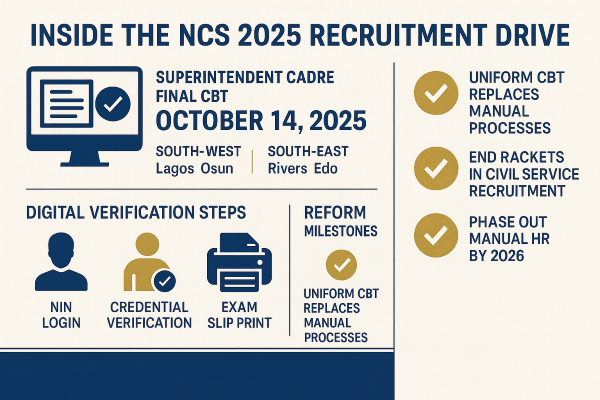Nigeria Customs Sets Oct. 14 for Senior Cadre Recruitment Exams as Service Deepens Merit-Based Reforms

In a decisive step toward completing its 2025 recruitment exercise, the Nigeria Customs Service (NCS) has announced October 14, 2025, as the date for the Computer-Based Test (CBT) for candidates in the Superintendent Cadre, marking the final phase of its multi-stage recruitment process.
According to an official statement published on the Service’s verified X (formerly Twitter) and Facebook handles, the nationwide examination will take place simultaneously across all six geopolitical zones, following months of document verification, pre-screening, and preliminary testing of thousands of applicants.
A Nationwide Merit-Based Selection Process
The NCS disclosed that the upcoming examination would be conducted concurrently in 12 designated centres across the country, aligned with candidates’ states of origin to ensure transparency and inclusiveness.
The selected venues include:
- South-West: Lagos and Osun
- South-East: Enugu and Abia
- South-South: Rivers and Edo
- North-Central: Abuja and Kwara
- North-East: Bauchi and Adamawa
- North-West: Kaduna and Sokoto
All qualified candidates have been instructed to log in with their National Identification Number (NIN) at https://updates.customs.gov.ng to verify their status, retrieve examination details, and print their coloured exam slips for presentation at the test centres.
“Candidates must report strictly to their assigned examination centres as indicated on their slips. Failure to comply may result in disqualification,” the Service warned.
The agency emphasized that this stage of the process is strictly reserved for applicants under the Superintendent Cadre, representing the senior officer tier in the current recruitment cycle.
Earlier Rounds: Inspectorate and Customs Assistant Exams
This announcement follows the successful completion of the CBT exams for Inspectorate and Customs Assistant cadres, which were held on October 9, 2025, across various zonal centres. Those tests marked the intermediate and entry-level recruitment phases within the Service’s 2025 intake.
The earlier exercises reportedly witnessed large-scale participation and were conducted under strict verification protocols, reflecting the Service’s growing commitment to fairness, transparency, and the use of technology in talent acquisition.
According to officials, only applicants who passed both the pre-test and live test stages, and whose credentials were independently verified, were shortlisted for the final round. This phased system, introduced under the current Customs management, aims to eliminate the long-standing perception of political influence and nepotism in civil service recruitment.
Institutional Reform: A New Era of Transparency and Efficiency
The ongoing recruitment drive is part of a broader institutional reform within the Nigeria Customs Service, which has been repositioning itself as a technology-driven, merit-based organisation under the leadership of Comptroller-General Bashir Adewale Adeniyi, MFR.
Since assuming office, Adeniyi has prioritized digital transformation, workforce restructuring, and strategic partnerships designed to align the agency’s human resource policies with global customs standards.
The Service’s recent shift to computer-based recruitment testing (CBT) represents one of the most significant departures from the opaque practices of the past. By leveraging digital verification tools, biometric authentication, and centralized scoring systems, the NCS has drastically curtailed the influence of manual intervention, ensuring that merit and competence drive the recruitment process.
This approach aligns with the Federal Government’s ongoing public sector reforms, which advocate for accountability, fairness, and efficiency in recruitment across Ministries, Departments, and Agencies (MDAs).
Why the NCS Recruitment Policy Matters
The Nigeria Customs Service remains one of the most strategic agencies in Nigeria’s economic structure — responsible for revenue generation, border management, anti-smuggling enforcement, and facilitating legitimate trade. With an estimated contribution of over ₦3 trillion annually to the Federation Account, Customs is a critical pillar of fiscal stability and national security.
In recent years, however, the Service has faced a dual challenge: an aging workforce and a surge in cross-border economic crimes. These realities have necessitated a new wave of recruitment targeting younger, digitally competent Nigerians who can operate modern customs systems, including e-declaration platforms, data analytics tools, and automated risk management systems.
The 2025 recruitment, therefore, is not merely a headcount exercise — it represents a strategic investment in institutional renewal. The new recruits are expected to inject fresh energy and digital savvy into the Service’s operations, particularly as it transitions toward e-customs automation and full implementation of the Trade Facilitation Agreement (TFA).
From Paper to Performance: Building a Modern Customs Service
The NCS’s recruitment transformation dovetails with its broader goal of aligning with the World Customs Organization (WCO)’s human capital development framework, which emphasizes competence, integrity, and continuous professional training.
In recent months, the Service has rolled out training partnerships with both local and international institutions to enhance technical capacity in cybersecurity, data-driven enforcement, and global trade compliance.
According to internal policy documents, the NCS plans to phase out manual processes across recruitment, performance evaluation, and promotions by 2026 — replacing them with AI-assisted human resource management systems. This evolution is expected to foster a culture of accountability and innovation, ensuring that every Customs officer is equipped for the demands of 21st-century border management.
BRANDECONOMY ANALYSIS: Raising the Bar for Civil Service Recruitment
The NCS’s recruitment process is fast emerging as a benchmark for other government agencies. Its transparent, merit-based model has not only enhanced public trust but also demonstrated that Nigeria’s public institutions can function efficiently when technology, leadership, and accountability converge.
By insisting on a uniform CBT framework and rigorous verification at every stage, the Service has effectively shut the door on racketeering — a problem that has historically plagued civil service recruitment in Nigeria.
With the October 14 examination set to conclude the 2025 recruitment cycle, the NCS stands at the frontier of Nigeria’s next generation of public sector reform — one that values competence over connections and transparency over tradition.












